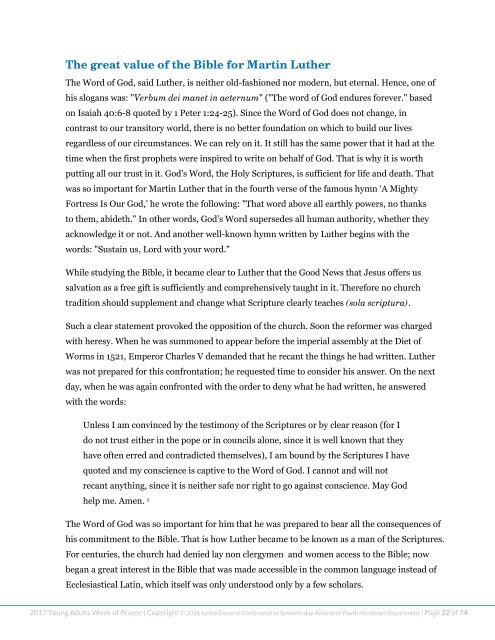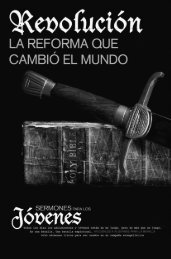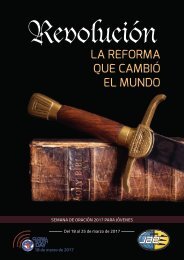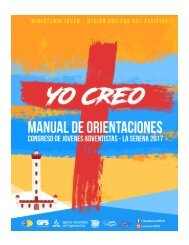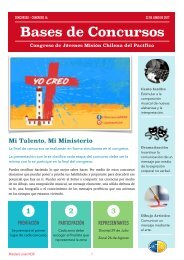Temario Semana de Oración JA - Ingles Asociación General
Create successful ePaper yourself
Turn your PDF publications into a flip-book with our unique Google optimized e-Paper software.
The great value of the Bible for Martin Luther<br />
The Word of God, said Luther, is neither old-fashioned nor mo<strong>de</strong>rn, but eternal. Hence, one of<br />
his slogans was: "Verbum <strong>de</strong>i manet in aeternum" ("The word of God endures forever." based<br />
on Isaiah 40:6-8 quoted by 1 Peter 1:24-25). Since the Word of God does not change, in<br />
contrast to our transitory world, there is no better foundation on which to build our lives<br />
regardless of our circumstances. We can rely on it. It still has the same power that it had at the<br />
time when the first prophets were inspired to write on behalf of God. That is why it is worth<br />
putting all our trust in it. God's Word, the Holy Scriptures, is sufficient for life and <strong>de</strong>ath. That<br />
was so important for Martin Luther that in the fourth verse of the famous hymn ‘A Mighty<br />
Fortress Is Our God,’ he wrote the following: "That word above all earthly powers, no thanks<br />
to them, abi<strong>de</strong>th." In other words, God’s Word superse<strong>de</strong>s all human authority, whether they<br />
acknowledge it or not. And another well-known hymn written by Luther begins with the<br />
words: "Sustain us, Lord with your word."<br />
While studying the Bible, it became clear to Luther that the Good News that Jesus offers us<br />
salvation as a free gift is sufficiently and comprehensively taught in it. Therefore no church<br />
tradition should supplement and change what Scripture clearly teaches (sola scriptura).<br />
Such a clear statement provoked the opposition of the church. Soon the reformer was charged<br />
with heresy. When he was summoned to appear before the imperial assembly at the Diet of<br />
Worms in 1521, Emperor Charles V <strong>de</strong>man<strong>de</strong>d that he recant the things he had written. Luther<br />
was not prepared for this confrontation; he requested time to consi<strong>de</strong>r his answer. On the next<br />
day, when he was again confronted with the or<strong>de</strong>r to <strong>de</strong>ny what he had written, he answered<br />
with the words:<br />
Unless I am convinced by the testimony of the Scriptures or by clear reason (for I<br />
do not trust either in the pope or in councils alone, since it is well known that they<br />
have often erred and contradicted themselves), I am bound by the Scriptures I have<br />
quoted and my conscience is captive to the Word of God. I cannot and will not<br />
recant anything, since it is neither safe nor right to go against conscience. May God<br />
help me. Amen. 1<br />
The Word of God was so important for him that he was prepared to bear all the consequences of<br />
his commitment to the Bible. That is how Luther became to be known as a man of the Scriptures.<br />
For centuries, the church had <strong>de</strong>nied lay non clergymen and women access to the Bible; now<br />
began a great interest in the Bible that was ma<strong>de</strong> accessible in the common language instead of<br />
Ecclesiastical Latin, which itself was only un<strong>de</strong>rstood only by a few scholars.<br />
2017 Young Adults Week of Prayer | Copyright © 2016 by the <strong>General</strong> Conference of Seventh-day Adventist Youth Ministries Department | Page 22 of 74


